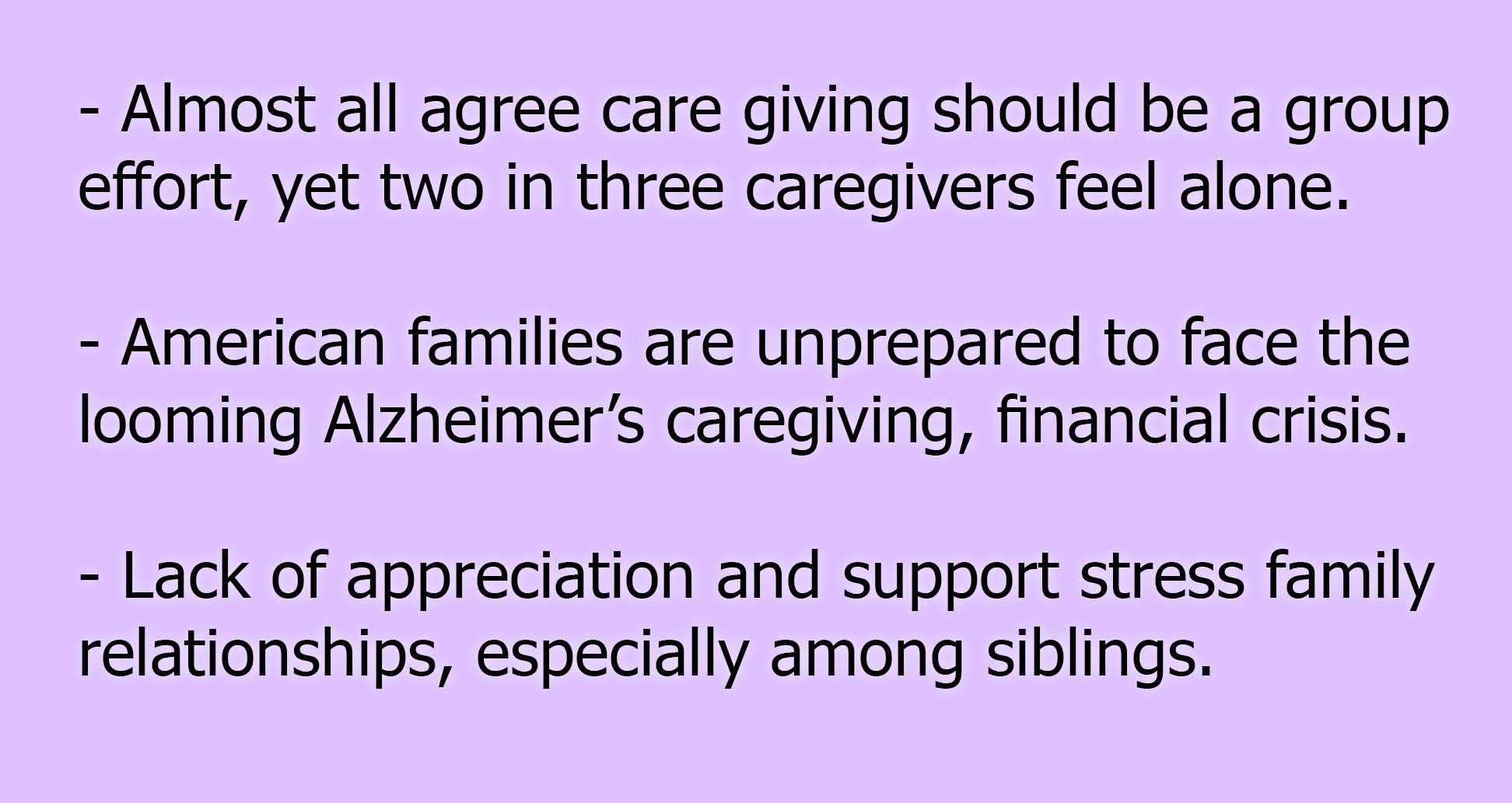New findings from an Alzheimer’s Association survey, released in conjunction with the beginning of Alzheimer’s & Brain Awareness Month, show that while people overwhelmingly agree it often takes a village to provide care for someone living with Alzheimer’s or another form of dementia (91 percent), far too many caregivers are doing it alone.
The survey found two out of three caregivers (64 percent) felt isolated or alone in their situation, and more than four in five caregivers (84 percent) would have liked more support with caregiving tasks, particularly from their family. The survey revealed the No. 1 reason people said they did not help with providing care for someone with Alzheimer’s or another form of dementia was they felt as though another family member had already taken on the responsibility (74 percent), followed by their not living in the same area (62 percent).
“There are currently 15 million Americans providing unpaid care for someone with Alzheimer’s or dementia, and this survey shows that we must alleviate the weight on the shoulders of these individuals” said Ruth Drew, Director of Family and Information Services for the Alzheimer’s Association. “It’s a problem that’s only going to get worse. As life expectancies get longer and the number of older Americans grows rapidly, so too will the number of individuals diagnosed with Alzheimer’s and family members affected.”
In fact, barring the development of a medical breakthrough, the number of Americans age 65 and older with Alzheimer’s is expected to nearly triple by 2050, from 5.5 million to a projected 16 million. Today, someone in the United States develops Alzheimer’s every 66 seconds; by 2050, this will hasten to every 33 seconds.
“Alarmingly, our research also shows that few people are planning for the devastating toll this disease may have on them and their families,” Drew continued. “The burden of Alzheimer’s on society is becoming crushing – and most families are unprepared.”
Few plan for caregiving costs and decisions
The survey found that people greatly fear becoming a burden to their families as they age, but they are not planning accordingly. For example, 70 percent of people fear being unable to care for themselves or to support themselves financially, but only 24 percent have planned financially for their families in preparation for any future caregiving needs. Moreover, 74 percent of people said they would prefer a paid caregiver, but only 15 percent have financially planned for one – an important consideration, since Alzheimer’s is one of the costliest diseases affecting seniors.
“Very few people are financially prepared for the cost of caring for someone with Alzheimer’s, which is made worse by the fact that most Americans lack adequate savings for retirement, and many have none,” said Beth Kallmyer, MSW, Vice President of Constituent Services for the Alzheimer’s Association. “The added burden of Alzheimer’s care on families that have neither planned for it nor saved for basic retirement needs is going to directly impact them and the public healthcare system. With a large segment of the American population reaching high-risk years for Alzheimer’s, we’re entering a crisis.”
Perhaps surprisingly, survey respondents were even less likely (20 percent) to have discussed their wishes with a spouse or other family member than they were to have made financial plans (24 percent). That lack of communication and cost burden can contribute to family tensions.
“Planning for the costs of care well in advance of need and discussing one’s wishes for future caregiving can help ease the burden on families and avert some of the tensions and family conflicts that may arise following an Alzheimer’s diagnosis,” Kallmyer said.
Alzheimer’s stress can bring families closer or tear them apart
Indeed, findings from the survey show that in some families, Alzheimer’s caregiving fosters strength and support, yet in other families, it tears relationships apart. Relationships between siblings were found to be the most strained, stemming from not having enough support in providing care (61 percent) as well as the overall burden of caregiving (53 percent). Among all caregivers who experienced strain in their relationships, many felt like their efforts were undervalued by their family (43 percent) or the person with the disease (41 percent).
Conversely, 35 percent of survey respondents said caregiving strengthened their relationships with other family members, with two out of three of these respondents reporting that they felt like the experience gave them a better perspective on life. Relationships between spouses/partners were strengthened the most from the experience, with 81 percent believing that “being emotionally there for each other” was a source of strength they drew upon for caregiving.
“Having the support of family is everything when you’re dealt a devastating diagnosis such as Alzheimer’s,” said Jeff Borghoff, 53, a Forked River, New Jersey, resident who has been living with younger-onset Alzheimer’s for two years. “My wife, Kim, has been my rock as we navigate the challenges of Alzheimer’s. It’s easy to want to shut down following a diagnosis, but that’s the time when communication within families is needed most.”
Resources for families
The Alzheimer’s Association can help people learn how to navigate changes in their relationships with family members and friends. In addition to its 24/7 Helpline(800-272-3900), the Association offers various resources for families including:
A new Alzheimer’s Association infographic, offering specific tips to help families resolve conflicts and cope with Alzheimer’s together
Guidance on financial and legal planning for Alzheimer’s
Tips on long-distance caregiving and care coordination to help families better manage caregiver responsibilities
A video series, featuring insights from people living with the disease on how to navigate the personal and emotional challenges that accompany an Alzheimer’s diagnosis
A community resource finder that helps families connect with local resources by simply entering their zip code
For these and other resources go to alz.org.





